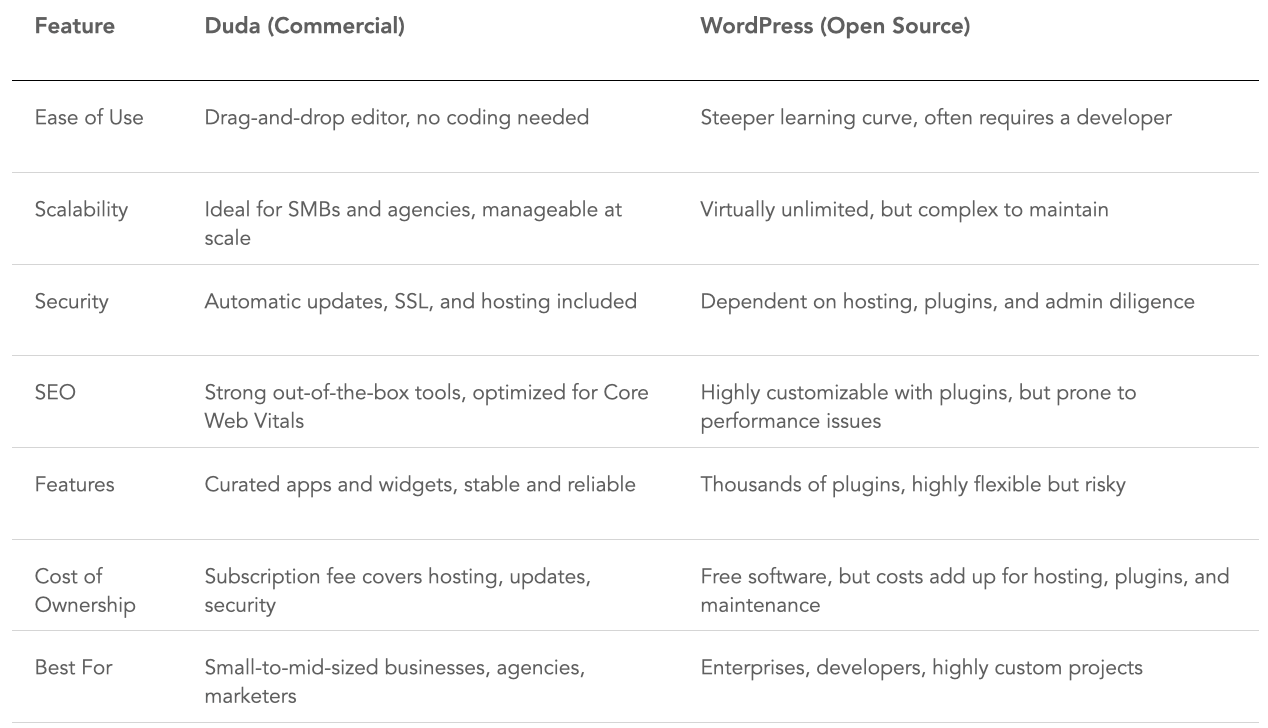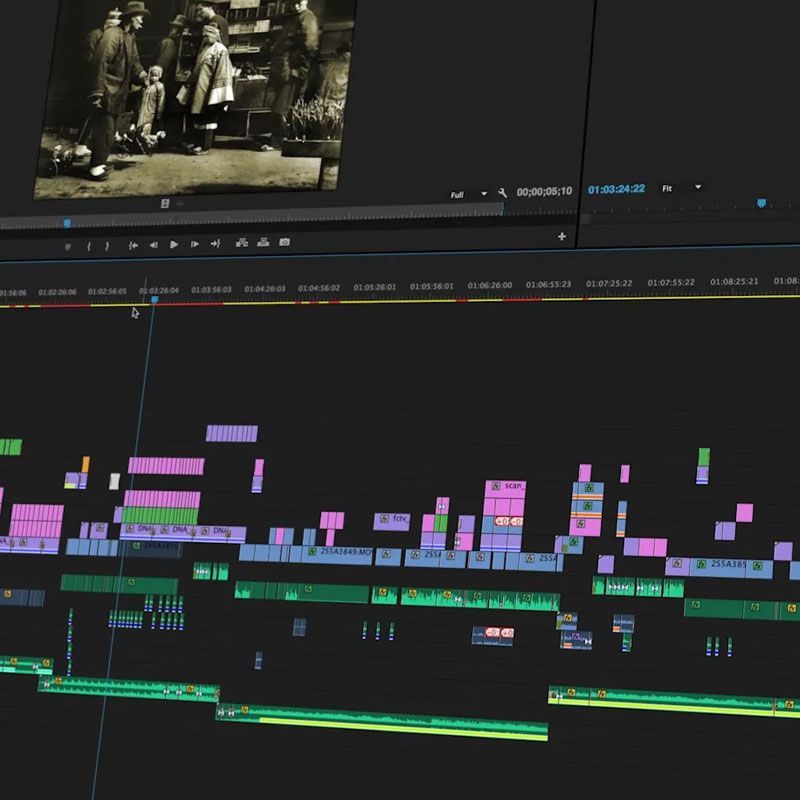Duda vs. WordPress: Choosing the Right CMS for Your Business Website

Duda vs. WordPress: Choosing the Right CMS for Your Business Website
I've been developing websites for far too long! I'm slightly embarrassed to say I started out working in PageMill back in the day, then moved to CyberStudio, which was then bought by Adobe and became Adobe CyberStudio, which eventually turned into Dreamweaver with the purchase of Macromedia... or something like that if memory serves. Yes, I'm showing my age🥺.
When I started my agency, Imagine That, Inc., in late 2007, we had to pick a platform that we would focus our development efforts on. Through that process, we developed on WordPress, Joomla, Drupal, and others, but eventually settled on Concrete5 (now ConcreteCMS) as our platform of choice due to its ease of use at the time, both in development and management. Years later, I now focus most of my development work on the Duda.co platform.
It's not uncommon for people to ask why I use Duda versus more commonly known platforms like Squarespace, Wix, or WordPress. In this blog, I hope to shed some clarity on why I use Duda versus WordPress. In future blog posts, I will speak to other popular platforms like Squarespace and what I believe to be one of the most powerful and versatile platforms out there called Webflow. I will also touch on the elephant in the room, Vibe Coding, i.e., Lovable!
In This Corner...
Duda is sort of a rising star and WordPress is the reigning heavy weight champion (sorry for the boxing metaphors!). Both platforms are popular for good reason—they give businesses the ability to create professional websites without reinventing the wheel. But they do so in very different ways.
The decision often comes down to how much control you want, how much technical complexity you’re willing to manage, and how you prioritize things like scalability, ease of use, SEO, and security.
Technology Bias
Before we do a deep dive into these two platforms, I want to address something I've seen over and over again when it comes to technology, and that is technology bias. Yes, this is a thing! Think of Mac vs PC, Android vs iPhones. This is not a casual, lighthearted phenomenon; it's real, and I've seen it deeply ingrained in people's psyches. Back in the day, it was mainframes vs those crazy client/server folks (PCs networked to servers). Then it was custom business applications vs Oracle. There are pro Wordpress folks and those who swear by Squarespace or Wix. We get intrinsically attached and comfortable to our technology and see other solutions as different, unknown or inferior. I will raise my hand and admit "guilty" to this as well. So although I try to be as unbiased as possible in the review below, please consider my own technology bias creeping in... ever so slightly ;-)
As a designer who works primarly with Duda, I’ve seen how it can simplify website management for small and mid-sized businesses. That said, WordPress continues to be the most widely used CMS in the world, with unmatched flexibility and an enormous ecosystem. Let’s dive deeper into both platforms and see how they compare.
Ease of Use
For most businesses, ease of use is where the difference between Duda and WordPress becomes most obvious.
Duda is built to be intuitive. Its drag-and-drop interface feels familiar, almost like editing a slide deck in PowerPoint or Google Slides. A restaurant owner who wants to swap out menu items, or a boutique shop adding photos of new products, can usually do so without calling a developer. Updates are immediate and don’t require worrying about plugins or code breaking the site.
By contrast, WordPress requires more technical literacy. The platform itself is straightforward enough—logging in, creating a post, or updating a page isn’t overly complicated. But the complexity starts to show when you want to make design changes, adjust layouts, or add new functionality. For instance, installing a plugin to add a booking system sounds simple, but it may require customizing settings, ensuring it works with your theme, and double-checking that it doesn’t conflict with other plugins. For a non-technical business owner, these steps often lead to frustration and reliance on outside help.
Takeaway: Duda makes day-to-day updates accessible to almost anyone, while WordPress often demands technical expertise or ongoing developer support.
AI Features: Built-In vs. Plugged-In
One of the clearest differences between Duda and WordPress today is how each platform handles AI. Duda has invested heavily in native AI tools, giving users the ability to generate meta titles and descriptions, alt tags for images, page content, and even layout variations right inside the editor. It’s streamlined, consistent, and designed to work without needing additional setup. For example, when you upload an image in Duda, the platform can automatically generate a descriptive alt tag on the spot, saving time and ensuring accessibility without any extra plugins.
WordPress, by contrast, doesn’t ship with any AI functionality in its core. Instead, it relies on an enormous ecosystem of plugins and, increasingly, AI-enabled themes and page builders like Elementor AI or Divi AI. This approach gives WordPress unmatched flexibility—users can choose specialized tools for SEO, content generation, chatbots, or ecommerce recommendations—but it also adds layers of complexity. For example, if you want AI to write blog meta descriptions in WordPress, you’d typically install a plugin like Rank Math, connect it to OpenAI or another AI provider, and configure it before you can generate results. For some, that flexibility is empowering; for others, it can feel like an extra layer of work compared to Duda’s all-in-one approach.
When it comes to AI, the choice between Duda and WordPress mirrors the platforms themselves. Duda is all about simplicity and speed—AI features are built right in, ready to use the moment you log in. For small businesses or agencies that want a streamlined experience without juggling multiple tools, that’s a huge advantage.
WordPress, on the other hand, leans into flexibility and customization. With the right plugins and setup, you can do everything Duda can and more—but it often takes extra time, technical know-how, and ongoing maintenance. For some, that trade-off is well worth it. For others, it makes WordPress feel heavier than it needs to be.
In the end, your choice may come down to whether you’d rather have AI that just works out of the box—or AI that you can tailor to do just about anything, provided you’re willing to roll up your sleeves.
Scalability
When people talk about scalability, they’re usually referring to how well a platform can grow with your business.
WordPress is nearly limitless in this respect. It powers everything from personal blogs to The New Yorker’s digital platform and even Fortune 500 websites. With the right hosting setup and custom development, WordPress can handle millions of visitors, thousands of pages, and highly complex integrations. For enterprises with deep budgets and IT teams, that kind of flexibility is hard to beat.
Duda, on the other hand, is purpose-built for small to medium businesses and agencies. It scales extremely well within that ecosystem. For example, a marketing agency can manage hundreds of client websites from a single dashboard, with consistent tools and easy duplication of design frameworks. But if you’re trying to build a complex custom e-commerce marketplace or a platform with heavy application logic, Duda will eventually hit its ceiling.
Takeaway: WordPress wins on raw scalability, but Duda delivers exactly the level of scalability most small and mid-sized businesses will ever need—without the technical overhead.
Security
Security is a concern every business has to face, and this is another area where the philosophies of the two platforms diverge.
With WordPress, security depends on you—or whoever manages your site. The core software is updated regularly, but vulnerabilities often creep in through plugins or outdated themes. If you don’t keep everything patched and updated, you may be leaving the door open to hackers. A real-world example: a local business I worked with had a WordPress site that was hacked simply because an old plugin hadn’t been updated in over a year. The cleanup cost more than rebuilding the site.
Duda eliminates much of that risk. Because it’s a closed, commercial platform, updates, SSL certificates, and hosting security are handled automatically. Business owners don’t need to think about firewalls or malware scans—it’s baked into the platform. That makes it especially appealing for organizations that don’t have IT departments but want peace of mind.
Takeaway: Duda offers a set-it-and-forget-it approach to security, while WordPress can be secure but requires constant vigilance.
SEO Capabilities
Both platforms can deliver excellent SEO results, but the path to getting there looks different.
Duda was designed with Google’s Core Web Vitals in mind. Features like automatic image compression, mobile responsiveness, and fast page load times are standard. It also generates XML sitemaps automatically, allows for structured data, and supports on-page optimization without extra plugins. For a business owner focused on local SEO—say, a law firm or a landscaping company—Duda has everything necessary to compete in search rankings without additional tools.
WordPress, meanwhile, is often hailed as the “SEO powerhouse.” And it can be, but not without configuration. Plugins like Yoast SEO or RankMath give you deep control over every aspect of optimization. However, site speed and performance can be compromised if too many plugins or heavy themes are used. I’ve seen businesses pour money into SEO consultants only to realize their WordPress site was being slowed down by bloated plugins, hurting their rankings.
Takeaway: Duda provides strong, user-friendly SEO out of the box, while WordPress allows for advanced customization but requires careful management to avoid performance issues.
Feature Flexibility
Here’s where WordPress truly flexes its muscles. With more than 70,000+ plugins, you can find a solution for almost anything—membership systems, multilingual setups, complex ecommerce, learning management systems, and more. Want to run an online course platform? WordPress can do it. Want to turn your site into a social network? It can do that too.
The downside is plugin management. Every new feature adds another layer of complexity and potential conflicts.
Duda, in contrast, takes a curated approach. It offers a smaller set of apps and widgets, most of which just work. You won’t find the same endless flexibility, but you’ll avoid the “plugin roulette” that can plague WordPress users. For most service-based businesses, ecommerce shops, or local companies, Duda’s features are more than enough.
Takeaway: WordPress is king of flexibility but at the cost of complexity. Duda is more limited but stable and reliable.
Blogging
In this realm, there’s no competition. If your website’s main objective is to regularly produce blogging content, WordPress clearly outshines Duda. With WordPress, the level of customization and advanced features makes blogging powerful and scalable. In contrast, blog creation in Duda tends to be cumbersome, limited, and requires a bit of tweaking.
That said, it’s not that you can't blog effectively with Duda (it's what I'm actually doing right now!); it simply isn’t designed primarly for that purpose as WordPress is. After all, WordPress was originally created as a blogging platform!
Takeaway: If you plan to blog consistently, say once a week or more, or if your website's primarily purpose as to blog, WordPress is undoubtedly the superior choice.
Open Source vs. Commercial Platform
This is the fundamental difference between the two.
WordPress is open source, meaning you own your site outright and have complete freedom to customize it. That freedom comes with responsibility: you must manage hosting, updates, backups, and security. The costs aren’t always obvious at first—many people are drawn to the “free” software, only to spend hundreds or thousands annually on hosting, premium plugins, and developer time.
Duda is a commercial platform. You pay a subscription, and in return you get an all-in-one package: hosting, security, updates, and support. You give up some flexibility, but you gain stability and a platform that evolves without requiring constant maintenance. For many small businesses, that trade-off is well worth it.

The Bottom Line
Both Duda and WordPress are excellent platforms, but they’re built for different kinds of businesses.
If you’re a small or mid-sized business that values ease of use, low maintenance, built-in security, and reliable SEO, Duda is hard to beat. It frees you up to focus on running your business instead of running your website.
If you’re an enterprise or need extreme customization, complex integrations, or niche functionality, WordPress remains the go-to choice—just be prepared for the ongoing work that comes with it.
In my experience, the biggest hidden cost of WordPress isn’t the price of hosting or plugins—it’s the time and stress of managing constant updates and technical troubleshooting. Duda, by contrast, lets you breathe easier, knowing your site will simply work.
Attention all Planets of the Solar Federation!
Everything is about to change. In fact, discussing website CMSs feels somewhat outdated with the exciting advancements in AI on the horizon. There’s a new contender in the field, and it promises to revolutionize everything... and I mean everything (just not quite yet). Yes, I'm talking about prompt-driven Vibe coding. I'll be providing a straightforward blog overview of this fundamental shift in website development in my next blog. Stay tuned!
Looking for a Trusted AI Marketing Consultant?
Reach out today for a complimentary consultation! Discover how Bryt Idea can help elevate your business!














